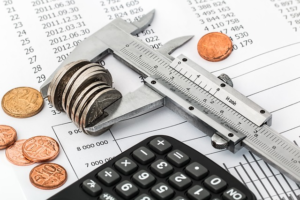What is a budget?
A budget is a financial guide that details how you spend your money monthly based on how much you earn. Knowing how to create a budget is necessary in periods of unpredictable inflation. It shows your income sources and expenses such as funds you allocate to expenses like rent, transport, debt, food, utilities, etc. Having a budget is important because it can help you to:
take control of your finances,
eliminate overspending,
make long-term financial goals and attain it
avoid late fees, pay fees on time, and stay out of debt

Why you need a budget
For one to attain any financial goal in life budgeting is the key. Unexpected or frivolous expenses can devastate your financial life if you do not budget. When you budget, you find it easy to save and it becomes so difficult to overspend. One needs a budget for many reasons:
To build an emergency fund
An emergency fund is a fund set aside for unexpected life occurrences. When life happens to you, an emergency fund of 3-6 months living expenses can help you get out of it. Having a budget will surely help you to save and when you save you build your emergency fund account. Financial experts advised that emergency funds should be up to 3-6 months worth of your salary.
Pay debts faster
Staying on budget is a panacea for staying debt-free. This is true because when you create a budget you will set out a portion of your income for debt repayment and most times it is always more than the minimum.
Save for the future
Creating a budget is the solution if you are struggling with saving money. Whichever rule you adopt for your budgeting, there will always be a portion set aside for saving monthly. Once it is followed diligently you will be able to save more money for the future or any capital project you want to embark on. Also having a budget, helps you identify areas where you can cut back, free more cash and channel towards savings.
Control your finances
With a budget, you are in charge of your finances. You determine what to spend and what not to spend. You learn how to practice delay gratification because you must stick to your budget. Unexpected bills will not get you off guard because you know where your money is going.
How to create a budget
To be able to have a realistic budget, have a financial goal in mind: long term or short term. You must also understand that at this stage your budget have to be flexible because you may have to adjust it as you progress because you are still learning. You will also need to decide whether your budget will be on paper, app or on a spreadsheet. Use the one that will be easier for you to access at any time until you get mastery of your budget. Below are the steps to on how to create a budget realistically:
Track your expenses
On a paper start by listing all your expenses you can remember especially those you must make within 1-2months. You can go ahead and group them into utilities, food, housing, tax, insurance, subscriptions, debt payments etc. Don’t forget to include your emergency fund at this stage. What normally hurt a budget are expenses that are not obvious. So you must LIST EVERYTHING that you spend on each month no matter how small. After listing them, put an estimate of what you think you spend on each of them each month.
List your income sources
List all your net income sources, both regular income and passive income. Put in the amount that comes in each month on each of the income source.
Subtract expenses from income
At this stage, add up all your expenses and substract it from your total income.
If you have zero, it means that you are on a zero budget. That means every dollar you make is put into use.
If you have left over when you substract the expenses from the income, you do not go and spend it anyhow. You have to put it to work too. You can add money to your emergency fund to increase it or keep it for miscellaneous because at this stage there may be some expenses you might have forgotten which you will definitely take into consideration next month.
If you have a negative number when you substract the expenses from the income, you sure need to cut down on your expenses. If you are still struggling to make both ends meet, increase your effort in your passive income sources and remember do not increase your spending when the income increases.
Track your transactions
This is the secret of a successful budget. Tracking your transactions means that you must account for every cent you spend. You did not create a budget to abandon it. Keep track of your spending. Before you spend, ask yourself which category am I deducting it from? Do I have a budget for it? When you buy lunch at work, subtract it from food expenses, when you pay your rent, deduct it from housing and so on.
Also make adjustments where necessary. If the water bill comes too high, tweak another budget line to make it up. If you got a reduction in your weekly or monthly subscriptions, do celebrate but move the money to the budget line that was too much.
Honestly, it is at this stage you learn how to stay on top of your budget, delay gratification, stay accountable and adjust your spending habits
Create a new budget and set your long term goal
Before the month ends, create a new budget for the upcoming month based on your performance the previous month. Like previously said, at this stage your budget have to be flexible until you can understand and track your expenses. Once this is done, decide how much you need to save for the long term. Based on your performance for the first 2-3 months how long do you think you can save before you achieve your long term goal? Do you think you need to reduce your spending more? Do you need to put more effort in your passive income? This is the time to act.
Budgeting tips and tools
To keep track of your budget on the go, this tips and tools will be useful:
-
Use a budgeting app
Tools such as mint or You Need A Budget makes budgeting easy especially on your mobile. Some of these tools helps to alert you when you are overspending, set up budget categories and help you track your spending.
-
Automate your savings
Most of the online money saving apps can easily automate your savings as your income drops. This will help you to know how much you have left for expenses
-
Budget for variable expenses
Find a way to factor in some expenses that do not occur every month and do not have fixed cost. Things like car repairs, birthdays, holidays etc. You can budget for things like this quarterly
-
Leave room for life
Do not forget to allocate some funds for yourself each month. Changing your clothes, shoes or going out on a date should not be left out because you are budgeting. You must make room to enjoy the good things of life too.
-
Re-budget when needed
Like said earlier your budget need to be flexible. You may need to re-allocate funds from one category to another that goes over temporarily. You are free to adjust your budget as your needs change
-
Try out different budgeting methods
In the first few months you can try out different budgeting methods such as the 50/30/20 budget or the cash-based envelope system. This will help you to know the type that will fit your spending pattern easily.
Conclusion
In building a solid financial foundation, creating and sticking to a budget is necessary. With it you can set up a system on how your debts will be repaid and increase your savings. It will open your eyes to where your money is really going. Yes, it may take some periods of trial and error before you arrive at your perfect budget system but it surely pays off at the end. Do not forget there are some free tools that can help you to get started,. Things like spreadsheet, budgeting apps and notebooks and notepads. Remember revise and readjust until you get your perfect budgeting system.
